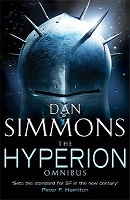Geoffrey Chaucer, The Canterbury Tales (Abridged) (1400) ***
"This Nicholas anon leet flee a fart, / As greet as it had been a thonder-dent"
Historically indispensable, but the tales themselves aren't interesting enough to bother following the mandatory translations and annotations after a while. Graciously abridged, or I would've had to resort to an audiobook that would make even less sense.
Various, Middle English Lyrics & Popular Ballads **
A bit sparse without some neofolk musical accompaniment.
Unknown, Everyman (~1485) ***
Comfortingly uncomplicated dramatic sermon.
Dan Simmons, The Hyperion Omnibus
Hyperion (1989) *****
A loose Canterbury Tales pastiche gives this twisted genre mash-up all the variety of a themed anthology. Reaffirming its place among my favourite novels, this is the only literary sci-fi saga I've really taken to, not that I ever felt like reading the sequels. Time to rectify that.
Faves: The Priest's Tale, The Scholar's Tale, The Consul's Tale
E. Nesbit, Five Children and It / The Phoenix and the Carpet / The Story of the Amulet
The Story of the Amulet (1906) ****
The generic gang supplement their sand fairy with a time-travelling Stargate and struggle with the laws of time, magic and Edwardian etiquette in the admirably complex sci-fantasy finale to what I remembered being a considerably more lightweight series previously. Most triumphant!
Various, The Little Prince and Other Stories
E. Nesbit, The Railway Children (1905) ****
With its distinct lack of paranormal cryptids, I probably wouldn't have been caught up in these grounded moral japes back in the day, but now I can appreciate it as a classic I'm looking forward to failing to pass down. Mature, sombre and slow without being dull, it clearly set the template for so many lesser children's novels read throughout school.
Various, Children's Literature: An Anthology 1801–1902
James Kirke Paulding, Florella, or the Fairy of the Rainbow (1839) **
Not entirely convincing communist parable. This ain't your Old World fairy tale.
Catherine Sinclair, From Holiday House (1839) ***
An author who was presumably raised on the harsh moral tales from earlier in the anthology lights the flame of rebellion and posits dangerous forgiveness. She presumably got a good whipping.
Charlotte Barton, Anecdotes of the Aborigines of New South Wales (1841) *
Horrific racist downer.
Harriet Mozley, From The Fairy Bower, or The History of a Month. A Tale (1841) **
Child characters enter the third dimension and are welcomed to share the trifling preoccupations of Victorian chick lit.
Robert Browning, The Pied Piper of Hamelin (1842) ****
A definitively whimsical retelling that even teases the smart-arse contemporary sequel as you're formulating it.
Eliza Lee [Cabot] Follen, Three Little Kittens (1843) ***
No obscure verses about defecating and burying the pie remnants this time.
'William Churne of Staffordshire' (Revd Francis Edward Paget), From The Hope of the Katzekopfs (1844) ****
Victorian Roald Dahl. The first of these novel extracts where I'm game for more.
Richard Henry [Hengist] Horne, From Memoirs of a London Doll (written by herself; edited by Mrs Fairstar) (1846) ***
Victorian Toy Story.
Edward Lear, From A Book of Nonsense (1846/61) & The Jumblies (1871) **
I didn't need another Owl and Pussycat, though I can see why they usually stick with that one.
Captain [Frederick] Marryat, The Children of the New Forest (1847) *
Grim historical downer.




